The Legislative Yuan’s Internal Administration Committee on Monday is to review a proposed amendment to the National Security Act (國家安全法) that would cancel and confiscate pensions for military retirees convicted of leaking state secrets.
The amendment was proposed by Democratic Progressive Party (DPP) Legislator Chen Chi-mai (陳其邁) to close a loophole in regulations stipulating that the leaking of state secrets by military personnel after retirement does not result in their pension being canceled, as the case of retired major general Hsu Nai-chuan (許乃權), who was involved in the largest espionage case in the nation’s history.
Hsu was found guilty of leaking secrets to the Chinese Communist Party, but is still eligible to receive 70 percent of his original pension after serving his 34-month prison term, which ended in September last year.

Photo: Chen Chih-chu, Taipei Times
Under the Act of Military Service for Officers and Noncommissioned Officers of the Armed Forces (陸海空軍軍官士官服役條例), military retirees are only stripped of their pensions when they are found guilty of treason, are sentenced to life in prison or to death during their service, or are discharged for breaching the Punishment Act of the Armed Forces (陸海空軍懲罰法).
Despite amendments made in 2016, the National Security Act does not cover former military personnel who leak state secrets during their service, but who are convicted after retirement.
At present, military personnel’s pension would be canceled if they are sentenced to a prison term of seven years or longer; halved if the prison term is between three to seven years; reduced by 30 percent if the prison term is between two and three years; or reduced by 2 percent if they are handed a prison term of between one and two years.
Therefore, Hsu is still entitled to 70 percent of his original pension, or about NT$70,000 per month.
The draft amendment is an addendum proposing to cancel pensions to former military personnel if they breach the National Security Act, the National Security Information Protection Act (國家機密保護法) or the National Intelligence Services Act (國家情報工作法), and confiscate pensions already paid.
Meanwhile, a draft amendment to the Act of Military Service for Officers and Noncommissioned Officers of the Armed Forces, initiated by DPP Legislator Liu Shih-fang (劉世芳), seeks to cancel pension payments to active or retired military personnel and confiscate the sum they have already received if they are convicted of leaking intelligence.

‘FORM OF PROTEST’: The German Institute Taipei said it was ‘shocked’ to see Nazi symbolism used in connection with political aims as it condemned the incident Sung Chien-liang (宋建樑), who led efforts to recall Democratic Progressive Party (DPP) Legislator Lee Kun-cheng (李坤城), was released on bail of NT$80,000 yesterday amid an outcry over a Nazi armband he wore to questioning the night before. Sung arrived at the New Taipei City District Prosecutors’ Office for questioning in a recall petition forgery case on Tuesday night wearing a red armband bearing a swastika, carrying a copy of Adolf Hitler’s Mein Kampf and giving a Nazi salute. Sung left the building at 1:15am without the armband and apparently covering the book with a coat. This is a serious international scandal and Chinese

SECURITY: As China is ‘reshaping’ Hong Kong’s population, Taiwan must raise the eligibility threshold for applications from Hong Kongers, Chiu Chui-cheng said When Hong Kong and Macau citizens apply for residency in Taiwan, it would be under a new category that includes a “national security observation period,” Mainland Affairs Council (MAC) Minister Chiu Chui-cheng (邱垂正) said yesterday. President William Lai (賴清德) on March 13 announced 17 strategies to counter China’s aggression toward Taiwan, including incorporating national security considerations into the review process for residency applications from Hong Kong and Macau citizens. The situation in Hong Kong is constantly changing, Chiu said to media yesterday on the sidelines of the Taipei Technology Run hosted by the Taipei Neihu Technology Park Development Association. With

A US Marine Corps regiment equipped with Naval Strike Missiles (NSM) is set to participate in the upcoming Balikatan 25 exercise in the Luzon Strait, marking the system’s first-ever deployment in the Philippines. US and Philippine officials have separately confirmed that the Navy Marine Expeditionary Ship Interdiction System (NMESIS) — the mobile launch platform for the Naval Strike Missile — would take part in the joint exercise. The missiles are being deployed to “a strategic first island chain chokepoint” in the waters between Taiwan proper and the Philippines, US-based Naval News reported. “The Luzon Strait and Bashi Channel represent a critical access

COUNTERINTELLIGENCE TRAINING: The ministry said 87.5 percent of the apprehended Chinese agents were reported by service members they tried to lure into becoming spies Taiwanese organized crime, illegal money lenders, temples and civic groups are complicit in Beijing’s infiltration of the armed forces, the Ministry of National Defense (MND) said in a report yesterday. Retired service members who had been turned to Beijing’s cause mainly relied on those channels to infiltrate the Taiwanese military, according to the report to be submitted to lawmakers ahead of tomorrow’s hearing on Chinese espionage in the military. Chinese intelligence typically used blackmail, Internet-based communications, bribery or debts to loan sharks to leverage active service personnel to do its bidding, it said. China’s main goals are to collect intelligence, and develop a